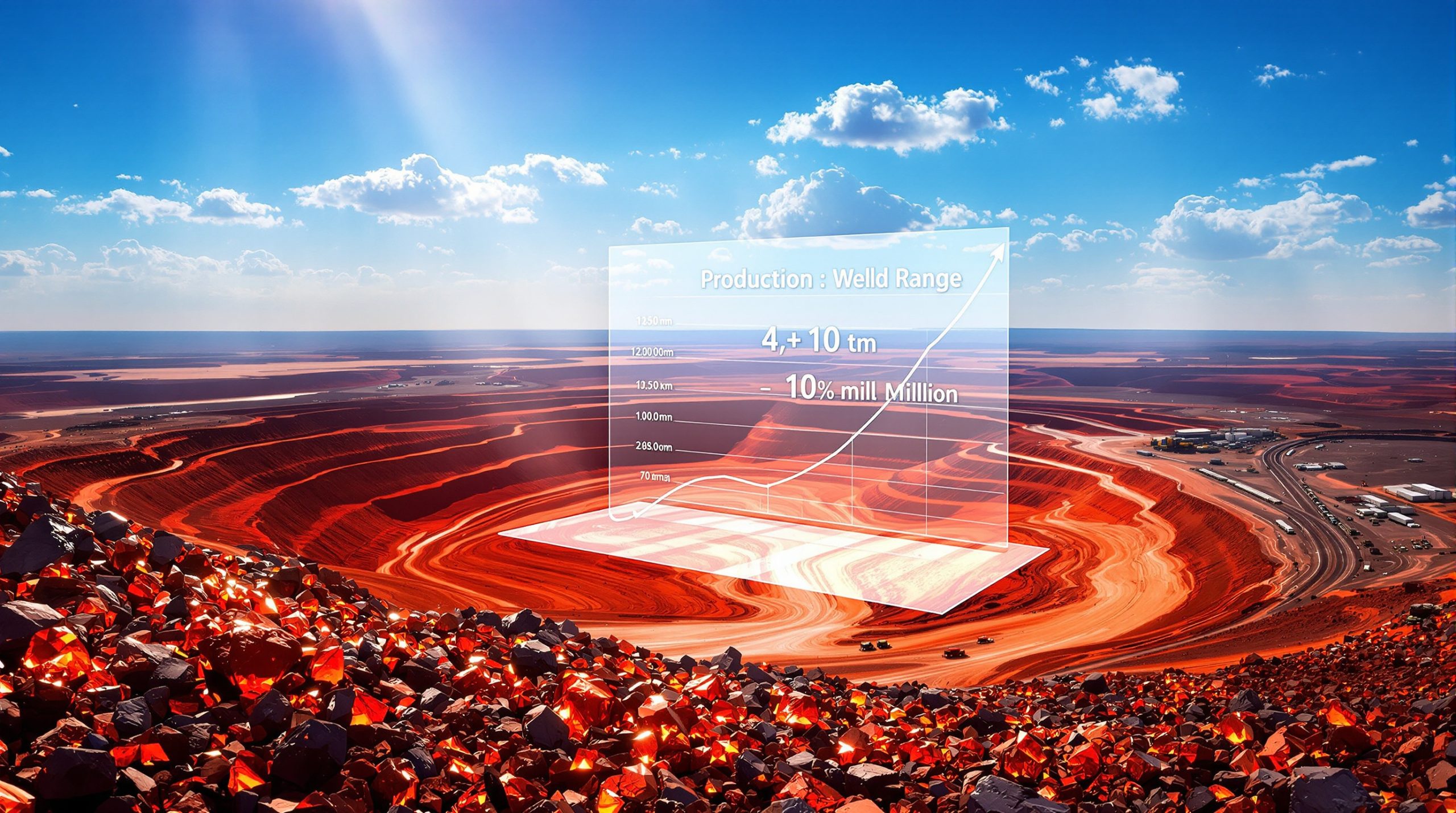Nigeria's Push to Cash in on Lithium Rush: Balancing Ambition with Reality
Nigeria stands at a crossroads in its economic development, with lithium emerging as a potential game-changer for a nation long dependent on oil revenues. As global demand for clean energy technologies surges, Nigeria's lithium deposits have attracted significant attention both domestically and internationally. This article explores the opportunities and challenges facing Nigeria's emerging lithium sector.
What is Driving Nigeria's Interest in Lithium Mining?
The global lithium market has experienced unprecedented growth, primarily fueled by the electric vehicle revolution and renewable energy storage systems. As a critical component in rechargeable batteries, lithium has become one of the world's most strategically important minerals for the green energy transition.
For Nigeria, lithium represents an opportunity to diversify an economy that has been overly dependent on oil exports for decades. With oil accounting for approximately 90% of Nigeria's export revenue, the country remains vulnerable to global price fluctuations and market disruptions.
The Global Lithium Boom and Nigeria's Strategic Position
Lithium has been dubbed "white gold" due to its crucial role in powering the clean energy transition. Global demand is projected to increase by over 40 times between 2020 and 2040, according to International Energy Agency forecasts, creating a massive market opportunity for countries with significant deposits.
Nigeria's central and northern states, particularly Kaduna, Nasarawa, and Kebbi, have revealed promising lithium-bearing pegmatite deposits during geological surveys. These discoveries have positioned Nigeria to potentially become a significant player in the global lithium supply chain alongside countries developing Australia lithium innovations.
"We must transition from being merely suppliers of raw materials to becoming globally competitive participants in high-value mineral supply chains," stated Minister Oladele Alake at an OECD conference in May 2025, highlighting the government's strategic vision.
Nigeria's Economic Diversification Strategy
Nigeria's economic vulnerability to oil price volatility has been painfully apparent during recent global market fluctuations. The government views lithium as a cornerstone of its minerals-based diversification strategy, potentially creating thousands of jobs while generating sustainable revenue streams independent of fossil fuels.
This strategic pivot aligns with global decarbonization efforts and positions Nigeria to participate in the value chain of clean energy technologies rather than merely supplying raw materials. The country's rejection of Tesla's 2022 proposal to purchase raw lithium demonstrates this commitment to moving up the value chain through mineral beneficiation opportunities.
How Extensive are Nigeria's Lithium Resources?
Nigeria's lithium potential is substantial, though still being fully mapped and quantified through ongoing geological surveys.
Mapping Nigeria's Lithium Deposits
Significant lithium-bearing formations have been identified across Nigeria's central and northern regions, with notable concentrations in Kaduna, Nasarawa, and Kebbi states. These deposits primarily occur in pegmatite formations containing spodumene, a lithium-rich mineral that's highly sought after for commercial extraction.
The Nigerian Geological Survey Agency has categorized these deposits as "high-grade and commercially viable," with lithium oxide (Li₂O) content ranging from 1.4% to 2.3% in some areas – comparable to commercially viable deposits in established lithium-producing regions with extensive Argentina lithium insights.
Comparison with Global Lithium Producers
While Nigeria is a newcomer compared to established lithium powerhouses like Australia (producing approximately 55,000 tonnes annually), Chile (26,000 tonnes), and China (14,000 tonnes), its geological potential positions it to potentially become Africa's leading lithium producer.
Zimbabwe currently leads African lithium production with approximately 1,200 tonnes annually, followed by modest outputs from the Democratic Republic of Congo and Mali. With proper development of its resources, Nigeria could potentially surpass these figures within the decade, according to mining industry analysts.
What Reforms is Nigeria Implementing to Develop its Lithium Sector?
Nigeria has initiated significant policy reforms to create a structured, formalized lithium mining sector that captures value domestically.
New Mining Regulations and Licensing Requirements
In a landmark policy shift announced in early 2024, President Bola Tinubu directed the Ministry of Solid Minerals Development to issue mining licenses only to companies establishing processing plants within Nigeria. This "value-addition" mandate aims to ensure Nigeria benefits from the entire lithium value chain rather than merely exporting raw materials.
The directive represents a fundamental rethinking of Nigeria's mineral resource governance, prioritizing in-country processing over quick export revenue. Companies must now demonstrate processing capacity plans before receiving extraction rights, effectively ending the practice of simple ore exportation.
Formalization of Artisanal Mining
The predominantly informal nature of Nigeria's mining sector has been a persistent challenge. In response, the government has embarked on an ambitious program to organize artisanal miners into regulated cooperatives with better safety standards, environmental practices, and tax compliance.
According to the Ministry of Solid Minerals Development, over 1,200 small-scale mining cooperatives have been formalized as of early 2025. Additionally, the government has deployed more than 2,000 mining "marshals" to police the sector, resulting in the arrest of 327 illegal miners and recovery of 98 mine sites.
The Ministry's spokesperson noted at an OECD conference: "Formalization is critical not just for revenue capture but for ensuring ethical mining practices that meet global standards for responsible sourcing."
How is Nigeria Approaching Lithium Processing?
Nigeria's strategy emphasizes domestic processing as a means of capturing more value from its mineral resources.
The Kangimi Processing Plant Case Study
In May 2024, a lithium processing plant was inaugurated with considerable fanfare in Kangimi village, Kaduna State. The facility—a joint venture between the Kaduna State government and Chinese company Ming Xin Mineral Separation Nigeria Ltd—was designed to produce 1,500 metric tons of lithium concentrate daily and generate between 1-1.5 billion Nigerian naira ($650,000-$980,000) in annual revenue.
According to Kaduna Mining Development Company (KMDC) video statements, the plant represented a $20 million investment and was projected to create approximately 1,500 direct and 5,000 indirect jobs for local residents.
Current Processing Capacity and Future Expansion
Despite the celebration surrounding Kangimi's inauguration, Nigeria's lithium processing capacity remains limited. The Kangimi plant itself is not yet fully operational more than a year after its launch, still awaiting necessary federal government approvals to begin commercial production.
However, significant expansion is on the horizon. Two additional Chinese-backed lithium processing plants, worth over $800 million combined, are scheduled to open in late 2025. These facilities, backed by Jiuling Lithium Mining Company and Canmax Technologies, represent major steps in Nigeria's lithium processing capacity expansion aimed at establishing a battery-grade lithium refinery capability.
Industry experts note that these investments follow China's established strategy of securing critical mineral supplies globally, particularly in Africa, where Chinese companies have made similar investments in the Democratic Republic of Congo's cobalt sector and Zimbabwe's lithium operations.
What Challenges is Nigeria Facing in Lithium Development?
Despite ambitious plans, Nigeria's lithium sector faces significant operational and governance challenges.
Operational Hurdles at Processing Facilities
The gap between policy ambitions and implementation realities is evident at the Kangimi processing plant. Despite being inaugurated with considerable publicity in 2024, the facility remains largely non-operational as of mid-2025, still awaiting various federal approvals.
Field investigations by Climate Home News revealed that the plant is processing only minimal quantities of lithium ore, far below its designed capacity. The delays highlight the bureaucratic complexities of Nigeria's mining governance system, where multiple agencies must coordinate approvals.
The experience at Kangimi raises questions about whether the two larger Chinese-backed processing plants scheduled for completion in late 2025 will face similar operational hurdles.
Supply Chain Traceability Issues
Nigeria's predominantly informal mining sector makes traceability along the lithium supply chain problematic. The ore mined by artisanal workers is typically sold to middlemen—some operating without proper licenses—who then sell it to larger traders or exporters.
"The informal nature of mineral trading creates significant revenue leakage and reputational risk for Nigeria," noted Amira Adamu Waziri from the Ministry of Solid Minerals Development during an OECD forum in May 2025.
Perhaps most concerning is the digital transformation of informal mineral trading. Climate Home News documented how lithium ore is now regularly traded through social media platforms like Facebook and TikTok, further complicating regulatory oversight.
- Facebook groups like "Nigeria mineral hub" have thousands of members posting lithium ore for sale
- Transactions are arranged through private messaging, bypassing formal channels
- Payment often occurs through mobile money services, leaving minimal paper trail
- Exports may be mislabeled as other minerals to avoid scrutiny
How are Local Communities Affected by Lithium Mining?
The benefits promised to communities near lithium operations have largely failed to materialize, while environmental concerns have mounted.
Employment and Infrastructure Promises
The Kangimi processing plant was promoted as a development catalyst for the local community, with KMDC officials promising approximately 1,500 direct and 5,000 indirect jobs. However, investigations revealed that only about 17 local youths were employed at the facility as of March 2025, primarily as security guards.
Similarly, commitments to improve local infrastructure have gone unfulfilled. Village head Danjuma Husseini told Climate Home News: "They promised to renovate our school, build a health facility, and construct the road to our village. None of these promises have been kept."
Resident Gambo Abdul, whose 12 children attend the dilapidated local school, expressed frustration: "The company failed us. Their promises were not kept."
Environmental and Health Concerns
Local communities have reported significant environmental impacts from lithium processing activities. In Kangimi, residents indicated that pits used to wash lithium ore with acidic chemicals are located near a dam that serves as their primary water source.
"During heavy rains, the water from these pits overflows into our dam," explained a community member who requested anonymity fearing reprisal. "The water changes color, and we worry about drinking it, but we have no alternative source."
Environmental experts note that lithium processing typically uses strong acids and chemicals that can contaminate water sources if not properly contained. Without robust environmental monitoring and enforcement, these impacts may worsen as processing capacity expands.
What are the Working Conditions in Nigeria's Lithium Mines?
Artisanal mining in Nigeria is characterized by hazardous working conditions, low wages, and minimal safety protections.
Safety and Labor Concerns in Artisanal Mining
Most lithium mining in Nigeria currently occurs through artisanal operations, where workers often face dangerous conditions. Miners frequently work in deep pits without proper safety equipment, facing risks of collapse and other hazards.
Abdulsalam Musa, a 19-year-old miner interviewed by Climate Home News, described working in pits up to 250 meters deep: "Sometimes, the pits collapse and if someone is trapped inside, that's his end." For this hazardous work, Musa earns approximately 4,000 Nigerian naira ($2.50) per day—barely enough to cover basic food costs.
The absence of safety equipment is striking: miners typically work without helmets, proper footwear, or respiratory protection, despite exposure to dust and potential chemical hazards.
Efforts to Improve Mining Practices
The government's formalization program aims to improve working conditions by bringing artisanal miners into regulated cooperatives with better safety standards. The Ministry of Solid Minerals Development reports that safety training is a component of the formalization process, though implementation remains inconsistent.
The deployment of mining marshals has led to increased enforcement actions against unsafe mining practices. However, critics note that enforcement tends to focus on licensing compliance rather than working conditions or environmental practices.
Labor advocates argue that without meaningful wage improvements and consistent safety enforcement, formalization may simply legitimize exploitative practices rather than substantially improving miners' lives.
How is Nigeria Addressing Illegal Mining and Resource Governance?
Nigeria has intensified efforts to combat illegal mining operations, though governance challenges persist.
Enforcement Measures and Legal Actions
The government's crackdown on illegal mining has produced measurable results, according to official reports. The Minister of Solid Minerals Development stated at an OECD forum that over 150 illegal operators are undergoing prosecution, with some convictions already secured.
These enforcement actions, carried out by the newly deployed mining marshals, aim to send a strong message about the government's commitment to regulating the sector and capturing revenue that would otherwise be lost to illegal operations.
The government has also established a Mineral Resources and Environmental Management Committee in each state to coordinate federal and state mining governance, though their effectiveness varies significantly by region.
Governance Challenges and Regulatory Effectiveness
Despite increased enforcement, governance challenges persist. Uche Igwe from the London School of Economics told Climate Home News: "If you don't regulate [the mining sector], you create an opportunity for all kinds of actors… So the buck stops at the federal government… to enforce the regulation."
Several structural issues complicate effective governance:
- Jurisdictional conflicts between federal and state authorities
- Limited technical capacity for monitoring and inspection
- Corruption risks throughout the licensing and export process
- Informal trading networks that operate outside regulatory frameworks
- Technological gaps in tracking minerals from mine to market
Experts note that the success of Nigeria's mining policies depends heavily on implementation and enforcement. The informal nature of mineral trading continues to complicate regulatory oversight.
What Role are International Investors Playing?
International investment in Nigeria's lithium sector has been dominated by Chinese companies, though Western interest is growing.
Chinese Investment in Nigeria's Lithium Sector
Chinese companies have emerged as the dominant investors in Nigeria's lithium sector, following China's established strategy of securing critical mineral supplies globally. Beyond Ming Xin's involvement in the Kangimi plant, other Chinese firms are making substantial investments in processing facilities.
Jiuling Lithium Mining Company and Canmax Technologies are developing processing plants worth over $800 million combined, scheduled to open in late 2025. These investments represent a significant escalation in China's engagement with Nigeria's mineral sector and implementation of a critical minerals strategy.
Chinese investment typically offers rapid infrastructure development and less stringent conditions compared to Western investment. However, critics note that Chinese-backed projects have sometimes fallen short on environmental standards and community benefits.
Western Interest and Market Dynamics
Western companies have also shown interest in Nigeria's lithium resources, though with a different approach. In 2022, the Nigerian government reportedly rejected a proposal from Tesla to purchase raw lithium, citing its new value-addition policy.
This rejection highlights Nigeria's determination to move beyond being merely a supplier of raw materials to becoming a participant in higher-value segments of the supply chain. However, Western companies typically bring different expectations regarding transparency, environmental standards, and community engagement.
The competition between Chinese and Western interests creates both opportunities and challenges for Nigeria as it seeks to maximize benefits from its lithium resources while navigating complex geopolitical dynamics in critical minerals.
What is the Future Outlook for Nigeria's Lithium Industry?
Nigeria's lithium industry stands at a critical juncture, with significant potential but substantial challenges to overcome.
Potential Economic Impact
If successfully developed, Nigeria's lithium industry could contribute significantly to the country's economic diversification goals. The sector has the potential to:
- Generate substantial export revenue outside the oil sector
- Create thousands of direct and indirect jobs
- Establish Nigeria as a key player in the global clean energy transition
- Attract foreign direct investment in processing and manufacturing
- Develop technical capacity in mineral processing and battery materials
The government's value-addition approach, if successfully implemented, could position Nigeria to capture more of the lithium value chain than other resource-rich countries that primarily export raw materials.
Persistent Challenges and Critical Success Factors
Several challenges must be addressed for Nigeria to realize the potential of its lithium resources:
- Governance and transparency must improve to ensure proper regulation and revenue capture
- Environmental protection frameworks need strengthening and consistent enforcement
- Community benefits must be delivered through binding agreements and accountability mechanisms
- Technical capacity for value-added processing requires significant development
- Supply chain traceability systems are needed to meet global responsible sourcing standards
The government's ability to effectively implement its policies will be crucial in determining whether Nigeria can truly capitalize on its lithium resources or whether it will become another example of the "resource curse" that has affected many resource-rich developing nations.
Industry experts suggest that Nigeria's success will depend on establishing stable regulatory frameworks, ensuring community participation, strengthening environmental oversight, and developing technical capacity—all while navigating complex relationships with international investors.
FAQs About Nigeria's Lithium Industry
How does Nigeria's lithium compare in quality to global standards?
Nigeria's lithium deposits contain lithium oxide (Li₂O) concentrations between 1.4% and 2.3% in pegmatite formations, which is comparable to commercially viable deposits globally. The quality is considered sufficient for battery-grade applications, though processing requirements may vary by specific location.
What percentage of Nigeria's lithium is currently processed domestically?
Currently, only a small fraction of Nigeria's lithium is processed domestically. The Kangimi plant and other facilities under development represent the country
Ready to Spot the Next Major Mineral Discovery?
Stay ahead of the market with Discovery Alert's proprietary Discovery IQ model, which instantly notifies investors about significant ASX mineral discoveries and turns complex mineral data into actionable insights. Visit our dedicated discoveries page to understand why major mineral discoveries can lead to substantial market returns and begin your 30-day free trial today.




